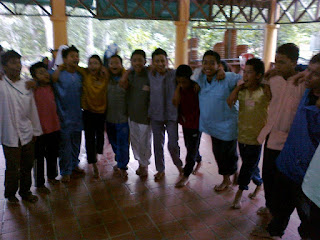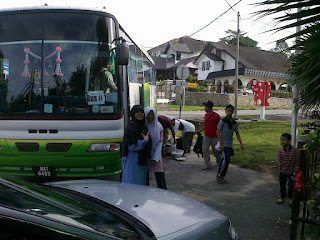Melahirkan Hafiz
TARBIYAH BERMULA DI RUMAH
Pengalaman Seorang Ayah Melahirkan 3 orang Hufaz
Pengalaman Seorang Ayah Melahirkan 3 orang Hufaz
Majalah ANIQAH September 2008
Wajah anak lelaki saya yang kedua Muhammad Widyan mensohorkan kesedihannya dan tiba-tiba dia menitiskan air mata pada satu pagi semasa saya menziarahinya bersama isteri di Maahad Hafiz di birai Sungai Kelang pada awal tahun 1996.
Saya tiba-tiba terasa sayu dan dapat membayangkan susahnya untuk melahirkan seorang hafiz yang dihadapkan dengan 21 mata pelajaran akademik dan pada masa yang sama terpaksa menghafaz al-Quran.
Wajah anak lelaki saya yang kedua Muhammad Widyan mensohorkan kesedihannya dan tiba-tiba dia menitiskan air mata pada satu pagi semasa saya menziarahinya bersama isteri di Maahad Hafiz di birai Sungai Kelang pada awal tahun 1996.
Saya tiba-tiba terasa sayu dan dapat membayangkan susahnya untuk melahirkan seorang hafiz yang dihadapkan dengan 21 mata pelajaran akademik dan pada masa yang sama terpaksa menghafaz al-Quran.
Dalam hati ini berdetik adakah sebagai seorang ayah saya begitu zalim untuk membebankan anak justeru aspirasi dan pengharapan yang begitu tinggi untuk melihat anak berjaya dalam bidang akademik dan pendidikan agama.
Itulah mukadimah kepada proses untuk melahirkan hafiz setelah saya sendiri mendidik kesemua lima orang anak saya membaca al-Quran ketika mereka berusia 4 tahun dan ketika berumur 11 tahun mereka khatam membaca 30 juzu’ al-Quran.
Peribahasa Inggeris “Charity begins at home” itu memang menepati konsep pendidikan atau tarbiyyah awal yang perlu dicernakan dalam sebuah keluarga Muslim dan ia bukan sahaja menjadi tanggungjawab ayah semata-mata tetapi dengan dokongan seorang ibu.
Untuk melahirkan generasi al-Quran yang unik ia bermula dengan kesedaran dan perlu kepada ilmu tentang al-Quran dan kerana ia adalah pembimbing dan satu-satunya tinggalan wahyu yang akan kekal hingga akhir zaman.
Oleh kerana Al-Quran itu diturunkan dalam bahasa Arab, maka untuk menggali sumber ilmu itu kita perlu mempunyai kemampuan memahaminya dengan mempelajari bahasa Al-Quran.
Secara peribadi saya mula berjinak-jinak mempelajari Bahasa Arab secara persendirian semasa saya berada di Amerika di salah satu pusat bahasa Tentera Udara Amerika di San Antonio Texas.
Secara peribadi saya mula berjinak-jinak mempelajari Bahasa Arab secara persendirian semasa saya berada di Amerika di salah satu pusat bahasa Tentera Udara Amerika di San Antonio Texas.
Apabila saya pulang ke Malaysia saya berguru secara talaqi mempelajari Bahasa Arab dengan seorang ustaz warga negera Indonesia yang kini menjadi imam di masjid Melbourne Australia.
Semasa saya melanjutkan pelajaran di universiti saya mengambil Bahasa Arab sebagai mata pelajaran elektif selama dua tahun dan kerana saya biasa mempraktikkannya saya tidak mempunyai masalah untuk bertutur dengan baik.
Semasa saya melanjutkan pelajaran di universiti saya mengambil Bahasa Arab sebagai mata pelajaran elektif selama dua tahun dan kerana saya biasa mempraktikkannya saya tidak mempunyai masalah untuk bertutur dengan baik.
Lantas saya mentarbiyyah anak-anak saya dengan dua bahasa iaitu Bahasa Inggeris dan Bahasa Arab berselang-seli bercakap sama ada di rumah atau semasa berjalan atau di restoran.
Buang sifat malu untuk bercakap Bahasa Arab sebab kalau kita perhatikan di sekeliling kita rakyat Malaysia ini sudah terbiasa bercakap rojak sekejap menggunakan bahasa ibunda sekejap menjadi Mat Salleh.
Ini bukan untuk menunjuk-nunjuk tetapi untuk membudayakan kehidupan kita sebagai manusia Muslim dan tidak ada apa yang perlu dimalukan kerana Bahasa Arab adalah bahasa yang mulia yang dipilih Allah sebagai bahasa wahyu.
Untuk membudayakan Al-Quran sebagai teman dan wirid harian kita perlu mempunyai azam dan tekad sekurang-kurangnya kalau kita tidak membaca Al-Quran, kita perdengarkan kaset atau CD Al-Quran umpamnya di komputer atau di kereta.
Apabila Al-Quran itu sudah menjadi lumrah dan sering dibaca dan dihayati serta menjadi halua telinga maka kita akan merasakan kemanisan Al-Quran dan lama kelamaan hati itu akan menolak apabila selain daripada Al-Quran itu diperdengarkan.
Memang Allah itu sentiasa benar dan benarlah firman-Nya yang mafhumnya dengan berzikir itu akan tenanglah hati dan zikir itu datang daripada mendengar ayat-ayat Allah.
Hidup dengan Al-Quran itu adalah satu kesinambungan dan proses tarbiyah untuk anak-anak di rumah itu bermula sejak hari pertama seseorang itu menjalani kehidupan berumah tangga dan acuannya dimulai dengan Al-Quran.
Saat berbulan madu sebagai suami isteri hanya sebentar kerana tanggungjawab mengemudikan sebuah kehidupan bermula dengan suami mengimamkan solat bersama isteri.
Al-Quran itu dijadikan satu rutin di dalam kehidupan dan suami isteri perlu duduk bersama membaca Al-Quran dan bertadabbur dengan ayat-ayat yang dibaca.
Saya masih ingat ketika ibu mertua saya dalam keadaan sakaratulmaut, saya berkejar mengambil dua orang anak di Maahad Hafiz dan mereka yang masih dalam tingkatan tiga dan tingkatan satu bergilir-gilir membaca Al-Quran.
Susana hening berlalu apabila lima minit sebelum ibu mertua saya menghembuskan nafas yang terakhir, dia masih sempat menghulurkan tangannya kepada anak-anak saya dah berkata,”terima kasih cu kerana doakan wan”, saya tidak dapat menahan air mata.
Sebenarnya semasa mula menghantar anak untuk belajar akademik dan tahfiz di sebuah sekolah swasta itu, hati kecil ini berkata apakah saya akan jadikan anak sebagai bahan eksperimen untuk melahirkan seorang hafiz dan apakah masa depan mereka?
Masa depan mereka terjawab apabila hafiz yang pertama Muhammad Widyan diterima belajar di Universiti Al-Azhar, yang kedua Muhammad Syahid di Universiti Islam Madinah dan yang ketiga Muhammad Irsyad di Universiti Islam Antarabangsa.
Anak saya yang ke Al Azhar mengambil bidang Qiraat, anak hafiz kedua yang mengambil bidang sains semasa SPM menyambung pelajarannya dalam bidang hadith manakala hafiz yang ketiga mengambil bidang undang-undang.
Kini saya memerhatikan anak-anak saya dengan rasa lega dan proses pentarbiyahan ini perlu diteruskan untuk melahirkan generasi Al-Quran yang istiqamah dan mengambil Islam sebagai Manhajul Hayah.












